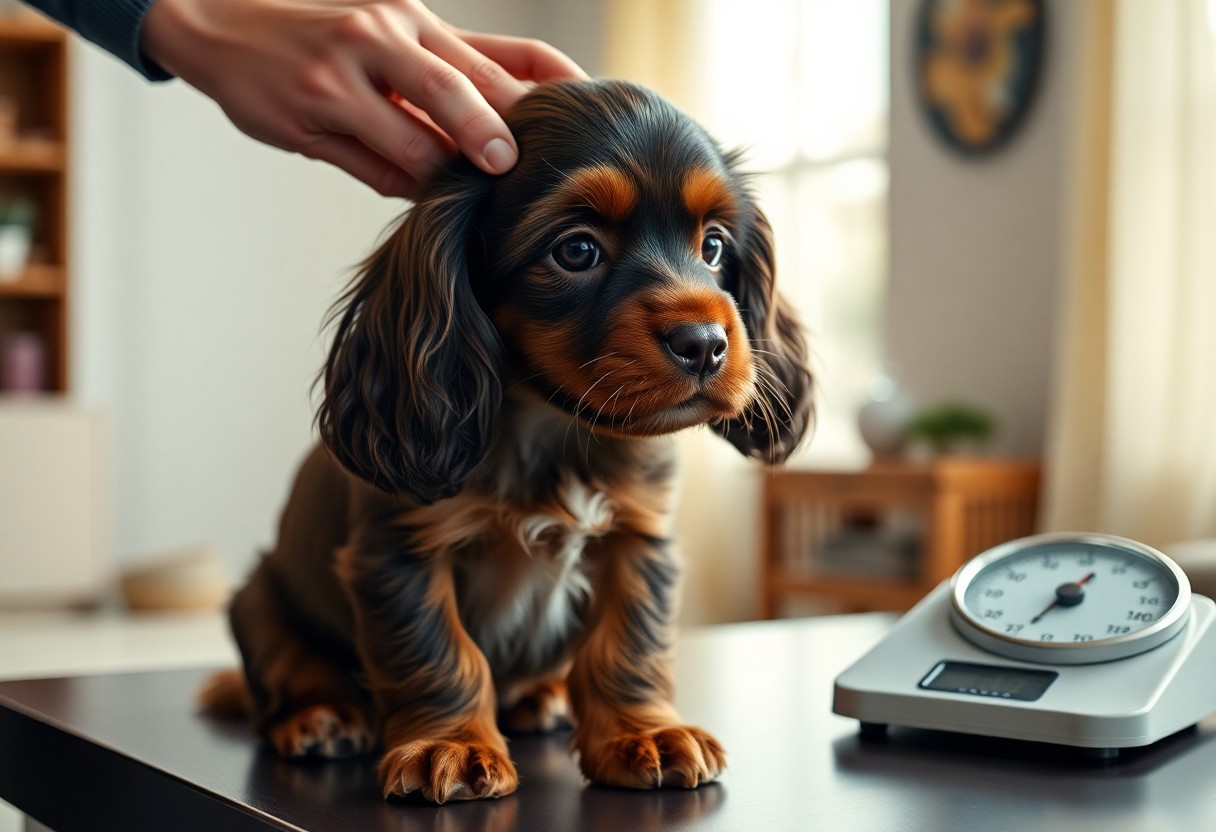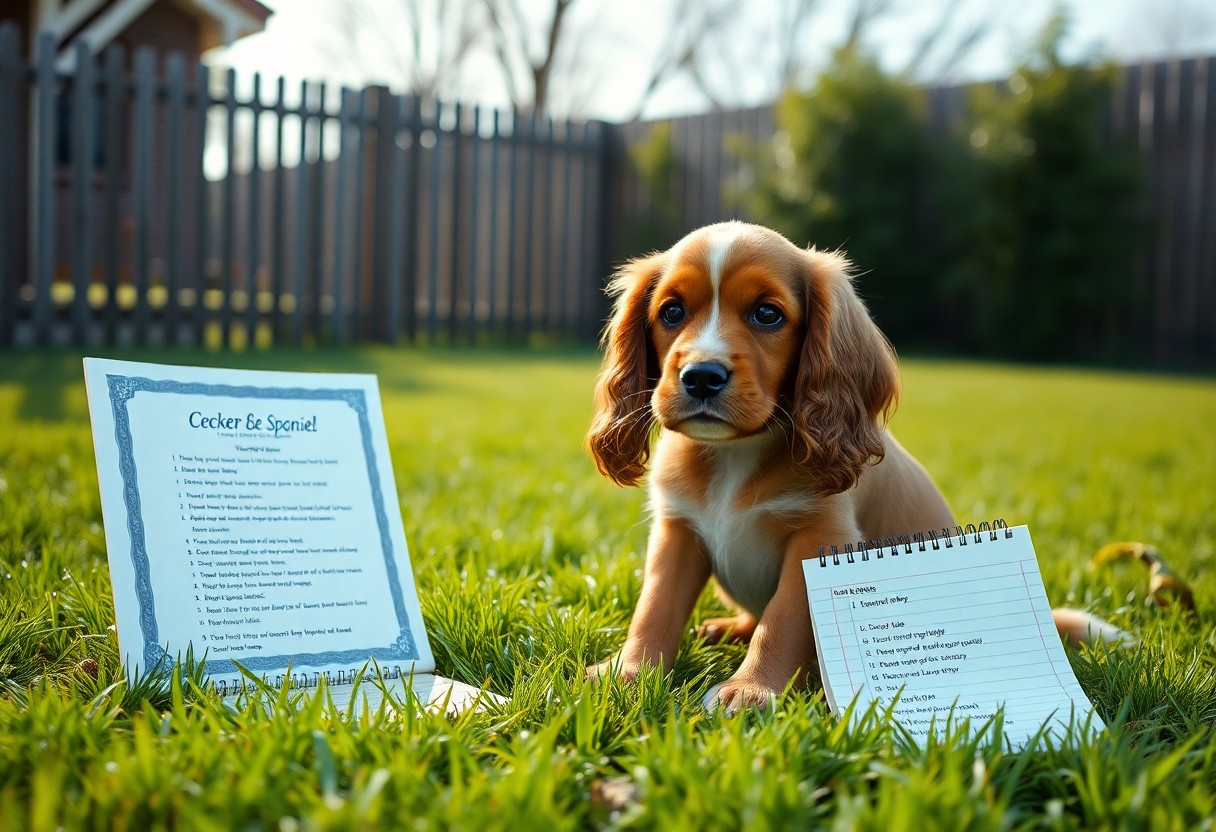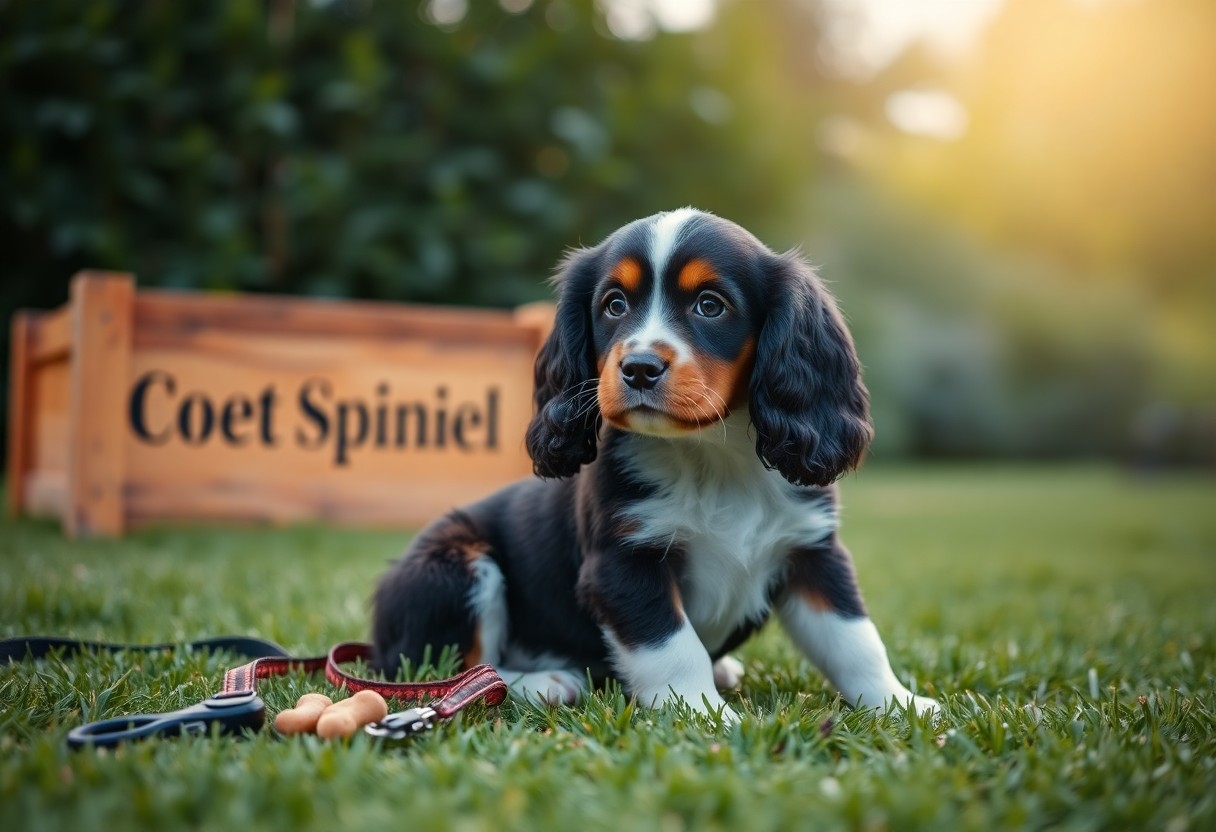Most potential Cocker Spaniel Puppy owners face challenges in selecting the ideal puppy due to the breed’s unique traits and needs. Understanding their grooming requirements, tempered personalities, and health considerations will help you make an informed decision. This guide provides important tips and insights, allowing you to choose a puppy that fits your lifestyle while preparing you for the joy and responsibilities that come with raising a Cocker Spaniel.
Key Takeaways:
- Research breed traits to ensure compatibility with your lifestyle.
- Meet the puppy’s parents to assess temperament and health.
- Choose a reputable breeder or rescue organization.
- Evaluate the puppy’s socialization and behavior with people and other animals.
- Consider the puppy’s health history and any potential genetic issues.
- Prepare your home with necessary supplies and a safe environment.
- Be ready for training and socialization to develop a well-adjusted dog.
Understanding Cocker Spaniel Breeds
Two distinct breeds of Cocker Spaniels exist: the American and the English. While they share a common ancestry, differences in appearance, temperament, and health traits can greatly influence your choice as a potential owner. Understanding these differences will help you select the right match for your lifestyle and preferences.
American Cocker Spaniel
The American Cocker Spaniel is known for its petite size and distinctive coat, featuring luxurious, long fur that often comes in various colors and patterns. This breed is typically more energetic and playful, making it an excellent companion for active families. With a friendly disposition, they thrive on social interactions and require regular grooming to maintain their stunning appearance.
English Cocker Spaniel
In contrast, the English Cocker Spaniel is somewhat larger and has a more athletic build. Renowned for their gentle and affectionate nature, they excel as both family pets and working dogs, often used in hunting. Their coat is also long but tends to be less intricate than the American variety, requiring less frequent grooming. This breed displays a high level of intelligence, making them highly trainable and eager to please.
English Cocker Spaniels have a distinctive character, often described as calm and adaptable. They thrive in family environments but also maintain an independent streak, making them suitable for various living situations. With an average lifespan of 12 to 14 years, investing in an English Cocker means welcoming a loyal friend who can adapt to your lifestyle, whether it’s active outdoor adventures or leisurely days at home. Regular exercise and socialization are vital to keep them happy and well-adjusted.
Identifying a Healthy Puppy
Evaluating a puppy’s health requires keen observation and a thorough assessment of its physical and behavioral traits. A healthy Cocker Spaniel puppy will exhibit clear indicators that reflect its overall well-being, from shiny fur to playful behavior. Being informed about these indicators can help you make a confident choice when selecting your new companion.
Physical Health Indicators
Look for a Cocker Spaniel puppy with bright, clear eyes and clean ears. The coat should be shiny and free from bald spots or excessive scratching, while a healthy weight is indicative of proper nutrition. Pay attention to the puppy’s skin; it should be smooth, with no signs of irritation or infections. Movement should be fluid, not stiff or awkward.
Behavioral Health Indicators
A lively Cocker Spaniel puppy displays curiosity and engages readily with its environment. An active puppy that interacts with littermates and humans demonstrates confidence and a well-rounded temperament. Signs of excessive fearfulness, lethargy, or aggression can signal underlying health issues or poor breeding practices.
During your visit, observe how the puppy interacts with its siblings and humans. Pups that eagerly approach you, wag their tails, and play with toys display positive social behaviors. In contrast, those that cower in the corner or show aggression may indicate potential behavioral issues. Additionally, a healthy puppy should exhibit an appropriate energy level—playful yet able to settle down when needed. This balance reflects mental and emotional well-being, imperative for a smoothly integrated family pet.
Evaluating Breeder Credibility
Choosing an ethical breeder is vital for ensuring a healthy, well-socialized puppy. Look for breeders who prioritize the welfare of their dogs over profit. Checking their membership in breed clubs or organizations can indicate credibility. Visit Choosing cocker spaniel for more insights on reputable breeders.
Researching Breeders
Start by gathering information about potential breeders online. Look for reviews, testimonials, and recommendations from previous puppy buyers. Make sure to scrutinize their websites for transparency regarding health testing, breeding practices, and puppy care.
Questions to Ask Breeders
Prepare a list of specific questions to ask breeders to assess their practices. Inquire about health testing for both parents, the socialization process of the puppies, and their return policy. A reputable breeder should be open and willing to discuss these matters.
Consider asking about the puppy’s background, such as any health screenings (like hip and elbow evaluations) performed on the parents and their lineage. Also, inquire about the breeder’s experience with the breed and whether they willingly provide references from past buyers. This exchange reveals their depth of knowledge and commitment to maintaining ethical breeding standards.
Socialization and Temperament
The socialization and temperament of your Cocker Spaniel puppy play a vital role in shaping their behavior and personality. These dogs are known for their friendly nature, but early social experiences can greatly influence their adaptability. By exposing your puppy to diverse environments, people, and other dogs, you foster confidence and reduce the likelihood of behavioral issues in adulthood.
Puppy Temperament Assessment
A puppy temperament assessment helps you gauge your Cocker Spaniel’s personality traits and potential behavior. Look for signs of curiosity, confidence, and playfulness, as well as the ability to handle stress. Observing interactions with littermates can also reveal how well your puppy may adapt to family life and various situations.
Importance of Early Socialization
Early socialization is a key factor in your Cocker Spaniel’s development. Exposing your puppy to different sights, sounds, and experiences between 3 to 14 weeks significantly reduces the risk of fear-based reactions as they grow. This exposure promotes a well-rounded character, helping your Cocker adapt smoothly to new situations, people, and pets.
During this sensitive period, aim for a wide variety of social interactions, such as puppy classes, playdates with other dogs, and trips to pet-friendly places. Positive experiences during this time frame can reduce anxiety and prevent behavior issues like aggression or excessive barking in the future. Engaging your puppy in play and exploration, while providing plenty of positive reinforcement, strengthens their confidence and resilience as they mature.
Preparing Your Home for a Puppy
Transitioning to life with a new Cocker Spaniel puppy requires thoughtful preparation of your living space. Create a designated area where your puppy can feel safe and comfortable, such as a cozy corner with a soft bed and minimal distractions. Establish boundaries to guide their movement, and ensure you have a routine in place for feeding, exercise, and potty training.
Essential Supplies
Gather all crucial supplies before bringing your puppy home. Invest in high-quality food and water bowls, a comfortable bed, puppy pads, and toys to keep your Cocker Spaniel engaged. Don’t forget grooming tools like brushes and nail clippers, as regular care is vital for their health and appearance.
Puppy-Proofing Your Space
Puppy-proofing involves removing hazards that could endanger your Cocker Spaniel’s health and safety. Secure all electrical cords, remove toxic plants, and keep harmful substances like cleaners and medications out of reach. Designate a specific area for play and rest to help your puppy feel secure and reduce anxiety.
Consider using baby gates to restrict access to certain rooms and remove any small objects they might swallow. Electrical outlets should be covered, and hazardous items like sharp tools should be stored away. Make sure to check for loose wires, as Cocker Spaniels are curious and may chew on things within reach. Regularly assess your space and adapt as your puppy explores and grows to ensure their environment remains safe.
Training Your Cocker Spaniel
Training your Cocker Spaniel is crucial for creating a well-behaved companion. Starting early, typically around 8 weeks old, allows you to instill good behaviors and establish a trusting relationship. Be consistent with commands and use positive reinforcement methods, such as treats and praise, to encourage learning and bonding. Regular training sessions, just 10 to 15 minutes long, can yield great results while keeping your puppy engaged.
Basic Training Techniques
Utilizing basic training techniques ensures effective communication with your Cocker Spaniel. Start with simple commands like “sit,” “stay,” and “come,” using hand signals alongside verbal cues. Sessions should be positive experiences, emphasizing rewards for desired behaviors. Practice regularly in various environments to enhance your puppy’s focus and adaptability.
Understanding Breed-Specific Training Needs
Cocker Spaniels possess distinct traits that influence their training needs. As a breed known for their intelligence and eagerness to please, these dogs respond well to engaging training methods. However, their sensitive nature may require a gentle approach to prevent anxiety. Keeping sessions light and fun is key to maximizing their learning potential.
With their strong hunting instincts, Cocker Spaniels benefit from training that harnesses their natural abilities. Activities such as agility, scent work, or retrieve games not only provide mental stimulation but also reinforce obedience. Addressing your puppy’s need for exercise and mental challenges while training increases their focus and enhances overall responsiveness. Understanding their specific characteristics allows you to tailor training methods effectively, creating a harmonious bond between you and your Cocker Spaniel.
Final Words
On the whole, selecting the right Cocker Spaniel puppy requires careful consideration of your lifestyle, the puppy’s temperament, and training needs. You should prioritize finding a reputable breeder or shelter that prioritizes health and socialization. By understanding what to expect regarding grooming, exercise, and companionship, you can ensure a fulfilling relationship with your new furry friend. Ultimately, your decision will play a significant role in shaping a happy and well-adjusted member of your family.
FAQ
Q: What factors should I consider when choosing a Cocker Spaniel puppy?
A: Consider the puppy’s health, temperament, lineage, and socialization. Look for a reputable breeder and assess the environment where the puppies are raised.
Q: How can I assess the temperament of a Cocker Spaniel puppy?
A: Observe the puppy’s behavior during interactions. A good puppy should be playful, curious, and friendly. Look for signs of confidence and a willingness to engage.
Q: What health checks should be done before bringing home a Cocker Spaniel puppy?
A: Ensure the puppy has received a veterinary check-up, vaccinations, and deworming. Ask for health clearances related to genetic conditions common in Cocker Spaniels.
Q: How important is socialization for a Cocker Spaniel puppy?
A: Socialization is very important. It helps the puppy become well-adjusted to various environments, people, and other animals. Start socialization early for the best results.
Q: What should I expect in terms of grooming needs for Cocker Spaniel puppies?
A: Cocker Spaniels require regular grooming due to their long, silky coats. Plan for routine brushing, bathing, and professional grooming every few months to maintain their coat.
Q: How much exercise does a Cocker Spaniel puppy need?
A: Cocker Spaniel puppies require daily exercise to stay healthy and happy. Aim for at least 30 to 45 minutes of playtime and walks each day to meet their energy needs.
Q: What should I prepare at home before bringing a Cocker Spaniel puppy?
A: Prepare a safe space with food and water bowls, a comfortable bed, toys, and puppy-proof the home by removing hazards. Stock up on quality puppy food and necessary supplies.


